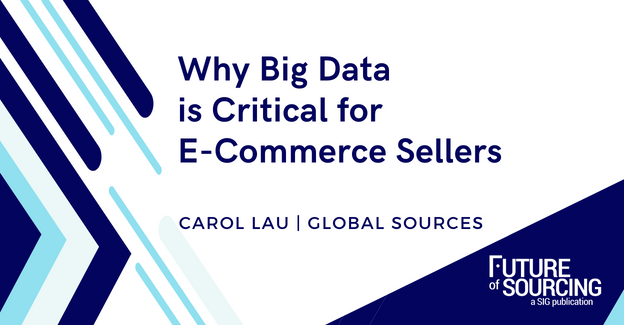Why Big Data is Critical for eCommerce Sellers
"By identifying patterns and trends in e-commerce data of the supply chains, businesses can improve decision-making, optimization, and problem-solving," says Carol Lau, Senior Vice President Client Service, Sales Support & Analytics, at Global Sources. In this article, Carol unlocks exactly why big data is essential for ecommerce sellers in today's marketplace.
Facing the surge of Covid-19, all B2B businesses are forced to switch to online e-commerce to accelerate digital transformation, and now it’s become more hybrid as the pandemic fades.
Businesses expect to be able to access relevant, up-to-date content anywhere, anytime, and on the device of their choice. This, indeed, is at the heart of what digital transformation is all about and there is no exception to the supply chain. Make it simple, digital transformation is the integration of digital technology into all areas of the business of a buyer or a supplier, fundamentally changing how it operates and connects buyers and suppliers, and how value is delivered to customers by keeping abreast of the latest market intelligence, and making sure they are trustworthy, and their products are quality-assured.
Deriving value from data
Businesses can derive as much value from analyzing data as their customer-facing counterparts, especially for e-commerce. The global big data analytics market is expected to grow with a compound annual growth rate of almost 30% in the coming years, with revenue reaching over 68 billion U.S. dollars by 2025 from around 15 billion U.S. dollars in 2019.
By identifying patterns and trends in e-commerce data of the supply chains, businesses can improve decision-making, optimization, and problem-solving. Businesses keep updated on the market trends by leveraging a smart B2B marketplace for sourcing, which provides market intelligence by using big data algorithm and enables the right business matching service with artificial intelligence and machine learning capabilities, where buyers can get more precise and customized recommendations based on product attributes, plus high-demand product ranking.
Looking for an experience, not just an interaction
Today, the expectation from buyers is that every interaction needs to be much more compelling and concise. According to McKinsey, around two-thirds of buyers opted for remote human interactions or digital self-service. With the support of Instant Chat with Translation and Video Meeting on the advanced B2B sourcing marketplace, buyers can now access verified suppliers to have real-time interaction more timely and effectively.
To ensure buyers can easily experience the sourcing journey through the video meetings with suppliers, detailed and precise product information like materials, textures, color Pantone and even conducting plant visits and audits of materials also play essential proof points in the development of prototypes to build buyer's confidence. Enabled by innovation and technology, 3D VR Showroom will allow buyers to glance at supplier factories without geographical limitations, and this will help buyers understand more background details of the suppliers.
Embracing a hybrid model
During the pandemic, mobile, apps, social media, real-time recommendations on eCommerce sites, machine learning, automation - all of these and much more - allow customers to get their hands on exactly what they want whenever they need it.
Other than that, buyers are becoming keen to attend online events, which are more segment-specific, or attend online shows to allow active buyers to personally interact with suppliers and identify the latest in-demand products & innovations. Participants can gain insights, understand the upcoming trends, and explore business opportunities by receiving recommendations from professional analysts, attending workshops conducted by top-notch e-commerce leaders, getting insider tips, case studies, strategic advice, and online business card exchange and business matching to bring buyers and suppliers to another level of success.
The world is still reeling from the pandemic in many ways, and virtual events continue to be a popular choice. Virtual events surprised the world with their flexibility, but physical events still possess a charm that can’t be reproduced virtually. However, with the ongoing relaxation of travel measures, offline tradeshow and events are expected to have a strong return, facilitating buyers and suppliers to meet and interact with each other, especially during the peak sourcing season in April and Oct.
With this in mind, the hybrid souring models may best serve customers how they want to be serviced, 85% of respondents expect hybrid sellers will be the most common sales role over the next three years. The buyer community is expected to go for a more hybrid mix of online and offline occasions where they can personally interact with the suppliers and feel the materials on the spot during offline tradeshows in the post-pandemic era.
In today's constantly connected world, B2B businesses are forced to use dynamic ways to do business to improve the customer/ buyer experience, which will, in turn, help them retain customers and acquire new ones. It will also mean that they will remain relevant and be able to compete against more advanced companies by being equally responsive to their customer evolving needs.
Region:









